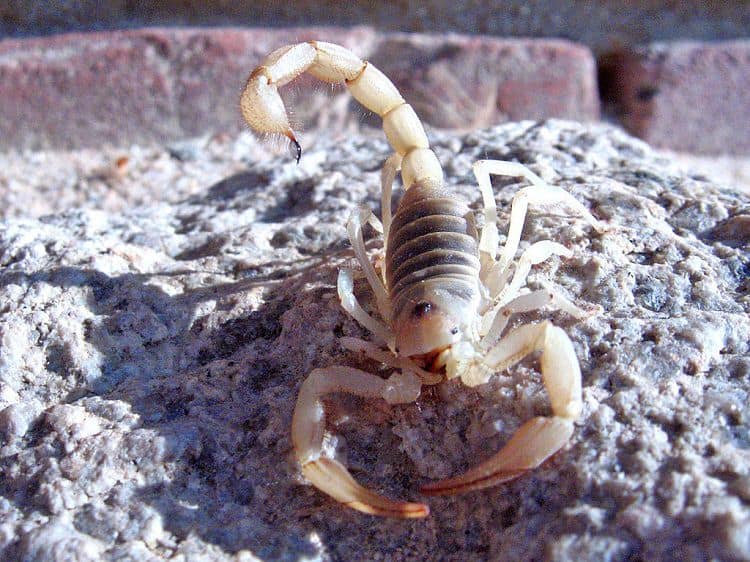Table of Contents
Although not your typical pet, scorpions are popular with those fascinated by these invertebrates. Individuals who like the exotic love watching these creatures scuttle about in their tanks. And contrary to popular belief, not all scorpions are extremely dangerous. That being said, it is important that they are handled with care. Moreover, they do not make suitable pets for children as they can and will sting if feeling threatened.
If you are considering a scorpion as a pet, or have recently acquired one, there are a number of things you will need to consider. These include the type of food they like to eat and how often you need to feed them. You will also have to consider factors such as light and heat. It is imperative that you provide everything a scorpion needs to thrive in captivity. In essence, you must strive to make your scorpions habitat as near to its natural environment as you possibly can.
as a pet, or have recently acquired one, there are a number of things you will need to consider. These include the type of food they like to eat and how often you need to feed them. You will also have to consider factors such as light and heat. It is imperative that you provide everything a scorpion needs to thrive in captivity. In essence, you must strive to make your scorpions habitat as near to its natural environment as you possibly can.
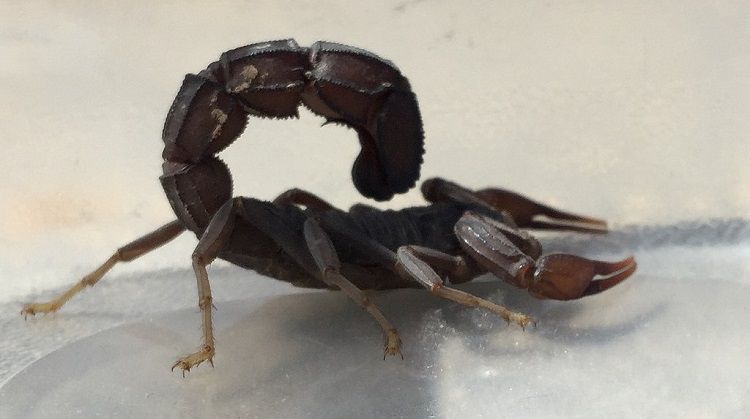
Black Fat-Tailed Scorpion 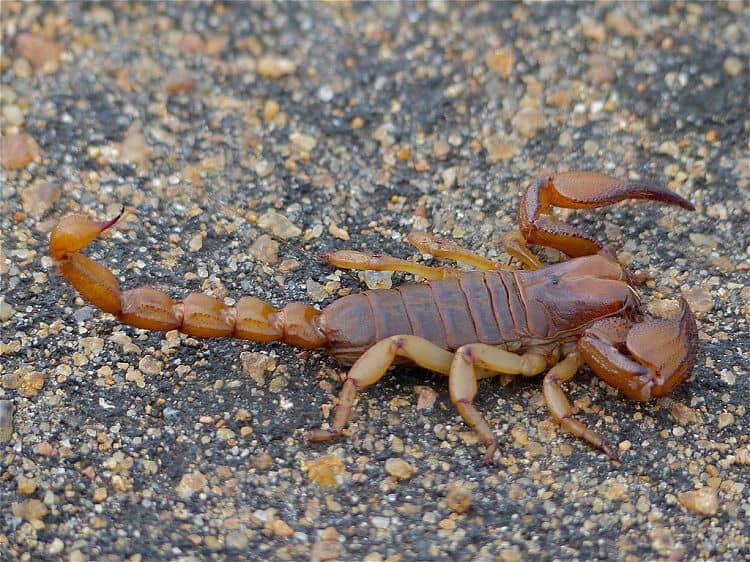
Shiny Burrow Scorpion 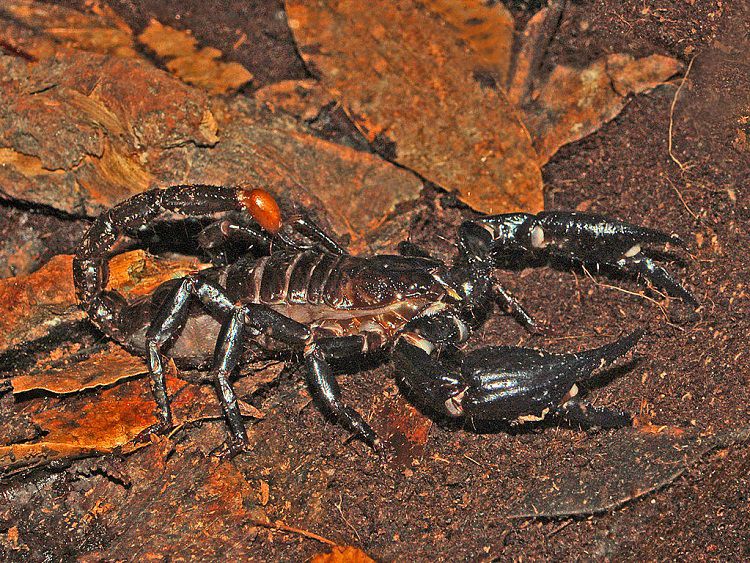
Malaysian Black Scorpion
Feeding a Pet Scorpion
In the wild, scorpions survive on a diet of spiders, insects, and even small snakes and lizards. This means that you will need to provide live food for your pet; the most common type of feeder will be crickets. You will need to buy these from a local pet store or from a reputable online seller. Although it might be tempting to offer your scorpion bugs that you find wandering about your home, we would not recommend this as you do not know what these bugs have been eating.
and lizards. This means that you will need to provide live food for your pet; the most common type of feeder will be crickets. You will need to buy these from a local pet store or from a reputable online seller. Although it might be tempting to offer your scorpion bugs that you find wandering about your home, we would not recommend this as you do not know what these bugs have been eating.
Unlike other exotic pets such as lizards, scorpions will only require feeding every couple of days, which means you will need to ensure the crickets you buy are fed and watered so that they too are happy and healthy before being fed to your pet. You will need some kind of enclosure for the crickets with a mesh lid as humidity is one of the biggest killers of these insects.
You will need to feed the crickets and provide areas for them to climb and hide (old egg cartons or the inserts from toilet paper are ideal). Crickets like to munch on vegetable peelings, fruits, and even crushed up dried dog food. You can make sure they are getting water by giving them leafy greens that have been rinsed or by placing wet cotton balls into the enclosure. Do not place bowls of water as they will fall in an drown.
What Else Can Scorpions Eat?
While scorpions love to eat crickets , there are other things you can give yours once in a while, just as a treat. Mealworms are a nice treat for scorpions, and these can also be purchased in pet stores. Some people also like to feed moths on occasion.
, there are other things you can give yours once in a while, just as a treat. Mealworms are a nice treat for scorpions, and these can also be purchased in pet stores. Some people also like to feed moths on occasion.
In the wild scorpions will eat flies, wasps, beetles, frogs, rodents, and snails. They are strict carnivores and do not eat fruit or vegetables.
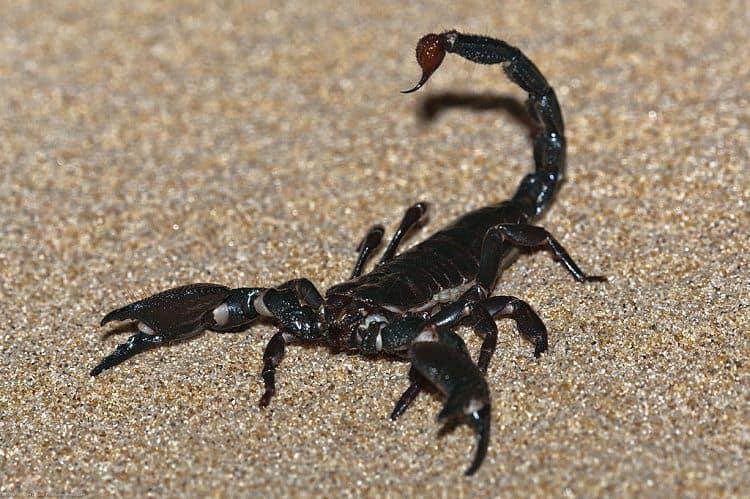
Emperor Scorpion 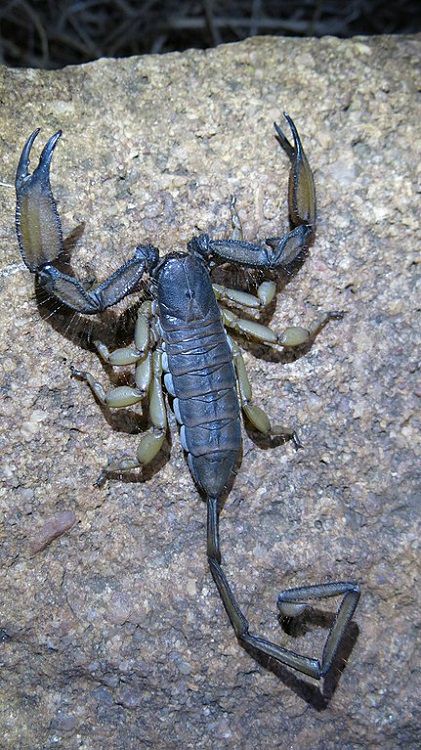
Flat Rock Scorpion 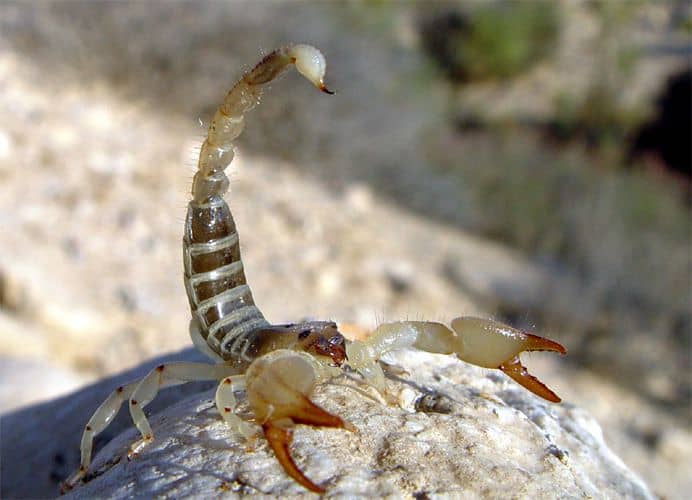
Large-Clawed Scorpion
Do Scorpions Need Calcium?
While some exotic creatures need additional supplements such as calcium and so need their food to be dusted in this, the same is not true for scorpions. As long as you are feeding gut-loaded insects such as crickets, your scorpion should be getting all the nutrition it needs from its food.
Do Scorpions Need Heat?
Scorpions are cold-blooded creatures and therefore will require an artificial heat source. A heat mat can be placed underneath the scorpion’s enclosure to regulate the temperature. You should set the daytime temperature to around 85F and the nighttime temperature to 75F.
Do Scorpions Need Light?
As nocturnal creatures, scorpions do not have a need for light. It is important therefore that you do not place your scorpion’s enclosure next to a window. Direct sunlight and UV light can cause scorpions to become stressed and, in extreme cases, it could lead to death.
Conclusion
As long as you can provide the right temperature and offer the correct food, your scorpion should be happy and healthy. Nevertheless, if you have any concerns about the health and wellbeing of your scorpion, you could always contact your nearest exotic vet for advice.
Photo Credits:
- Featured Image (Giant Hairy Scorpion): Robb Hannawacker
 – CC BY 2.0
– CC BY 2.0 .
. - Malaysian Black Scorpion: Hectonichus
 – CC BY-SA 3.0
– CC BY-SA 3.0 .
. - Flat Rock Scorpion: Ryanvanhuyssteen – CC BY-SA 4.0
 .
. - Black Fat-Tailed Scorpion: Speedphi – CC BY-SA 4.0
 .
. - Shiny Burrow Scorpion: Bernard DUPONT
 – CC BY 2.0
– CC BY 2.0 .
. - Emperor Scorpion: Mike Baird
 – “Mike” Michael L. Baird
– “Mike” Michael L. Baird – CC BY 2.0
– CC BY 2.0 .
. - Large-Clawed Scorpion: Guy Haimovitch – CC BY-SA 3.0
 .
.

